Unit 5 Sport Grammar-课件(共45张PPT)
文档属性
| 名称 | Unit 5 Sport Grammar-课件(共45张PPT) | 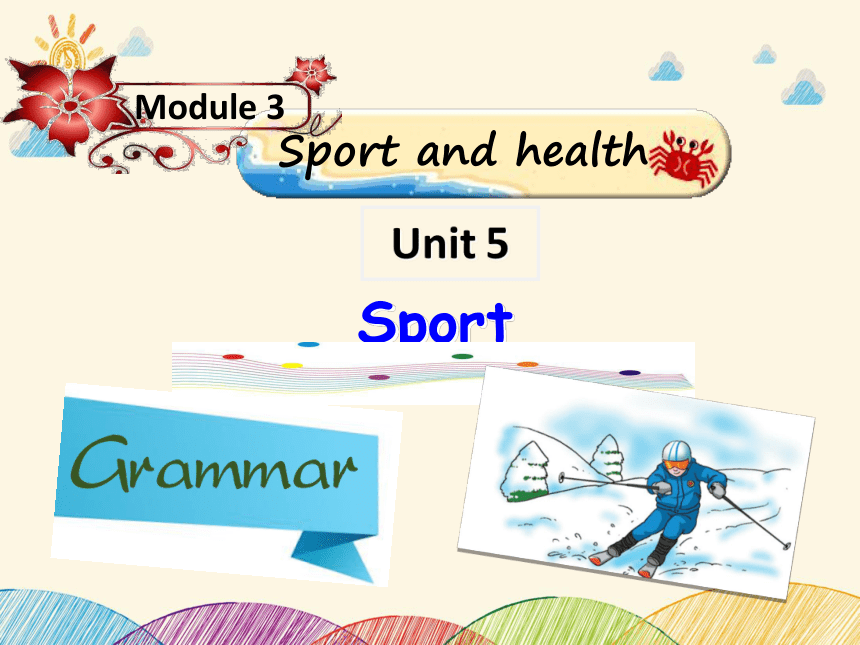 | |
| 格式 | ppt | ||
| 文件大小 | 4.5MB | ||
| 资源类型 | 教案 | ||
| 版本资源 | 牛津深圳版 | ||
| 科目 | 英语 | ||
| 更新时间 | 2022-05-31 21:20:01 | ||
图片预览

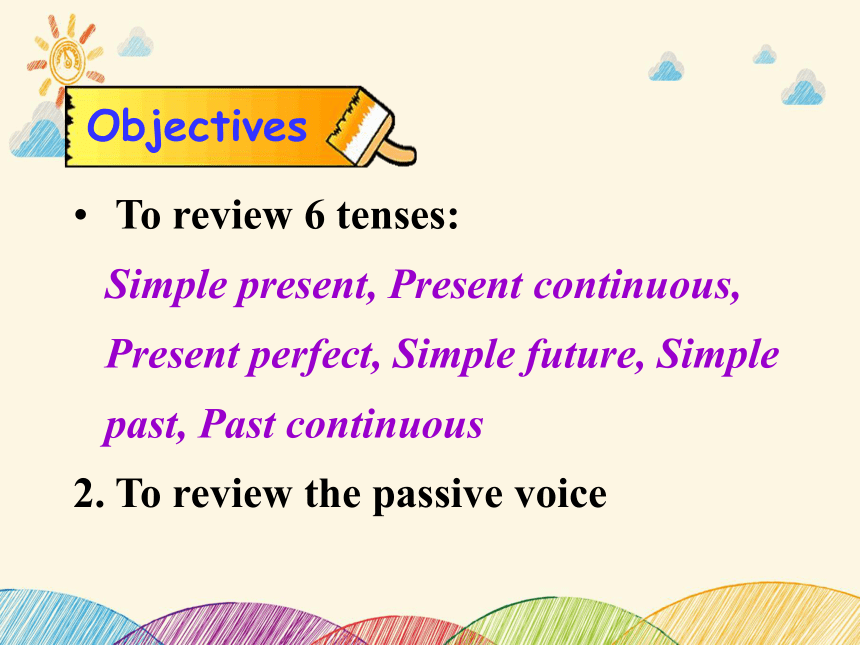
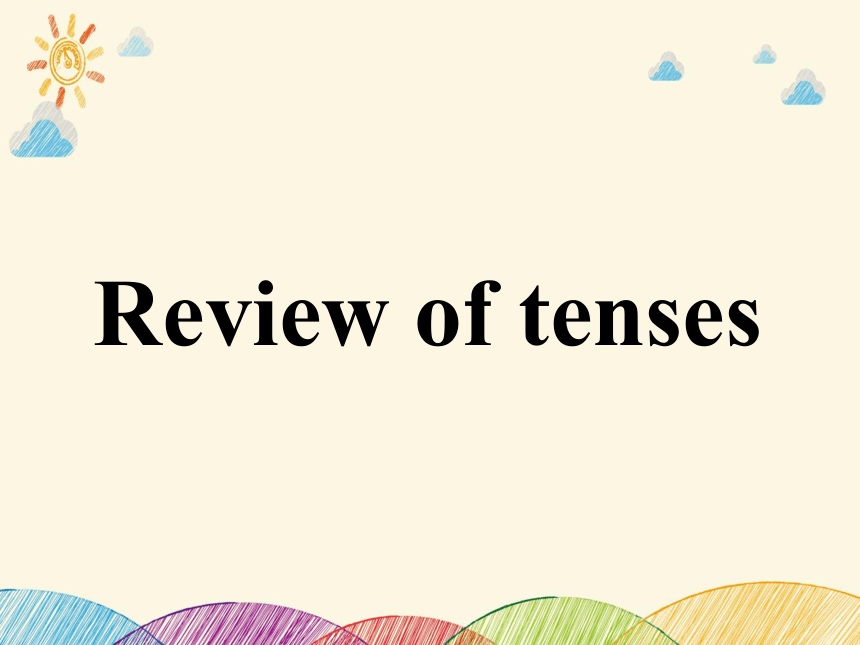

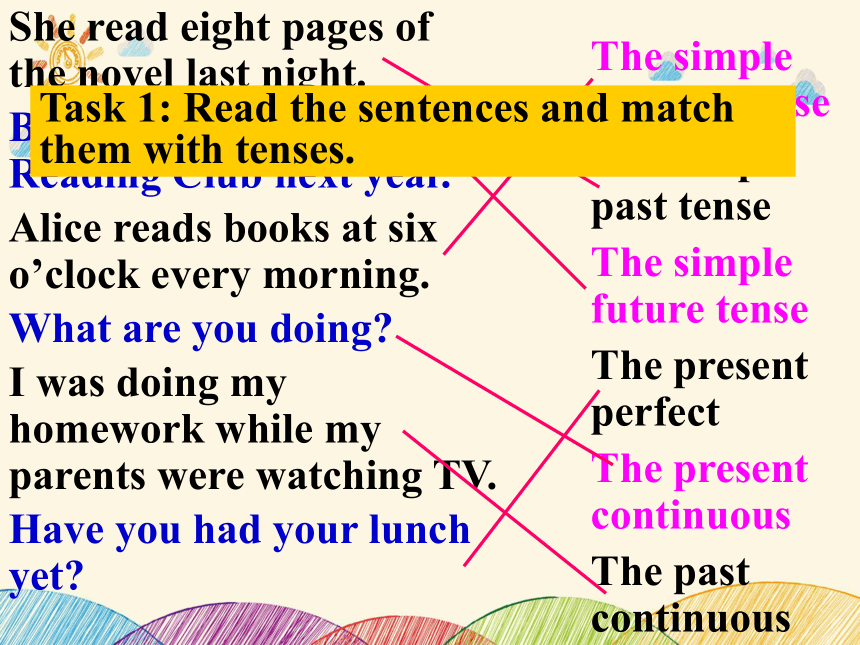
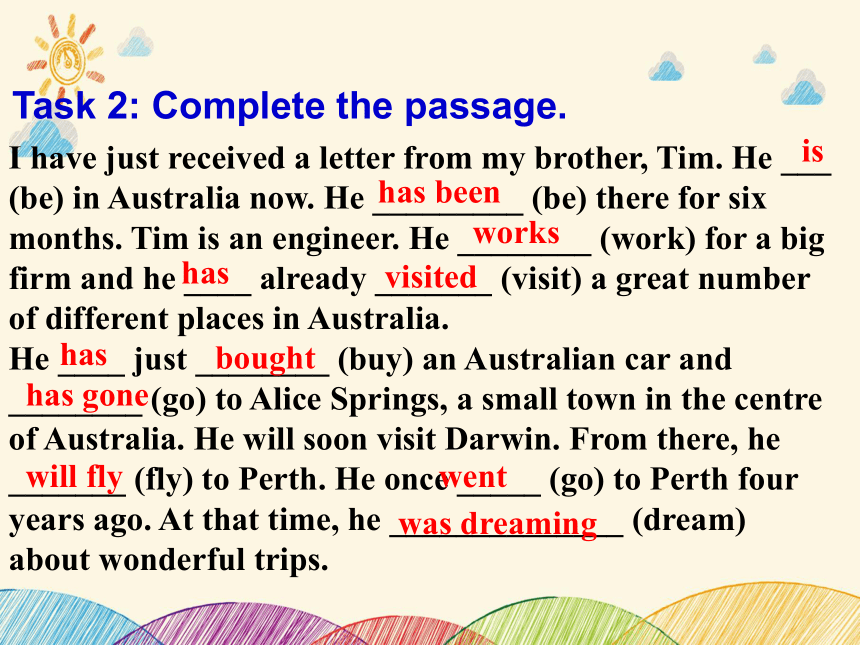
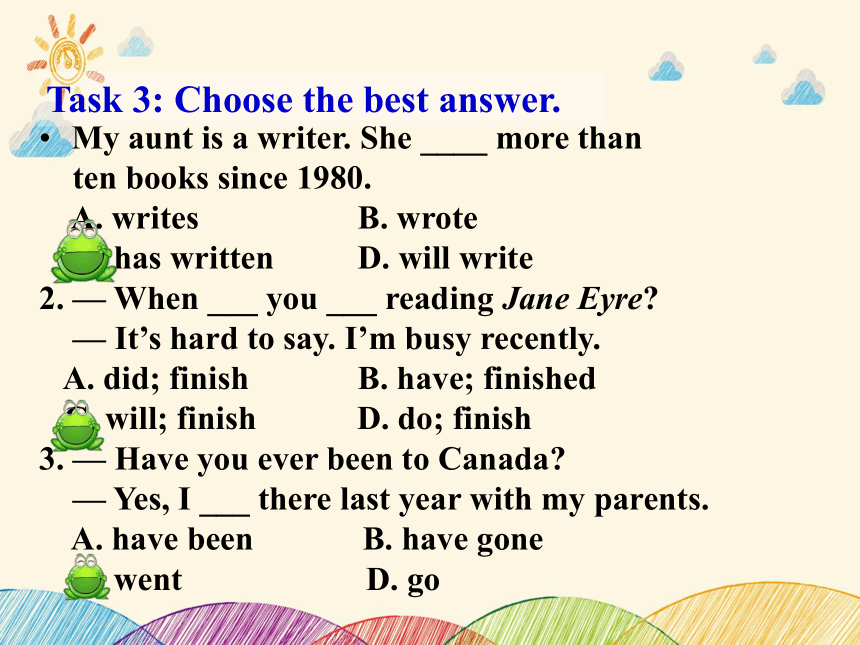
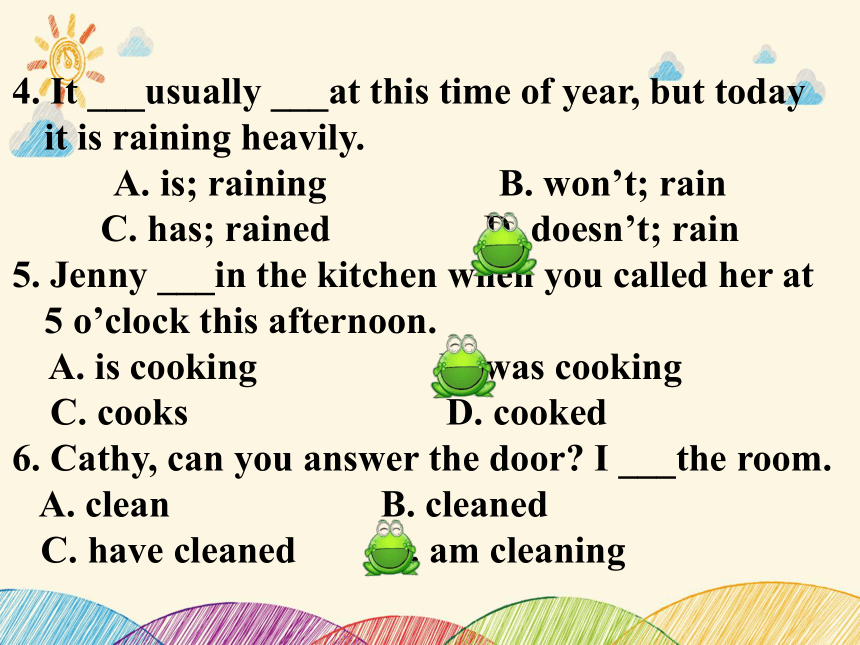
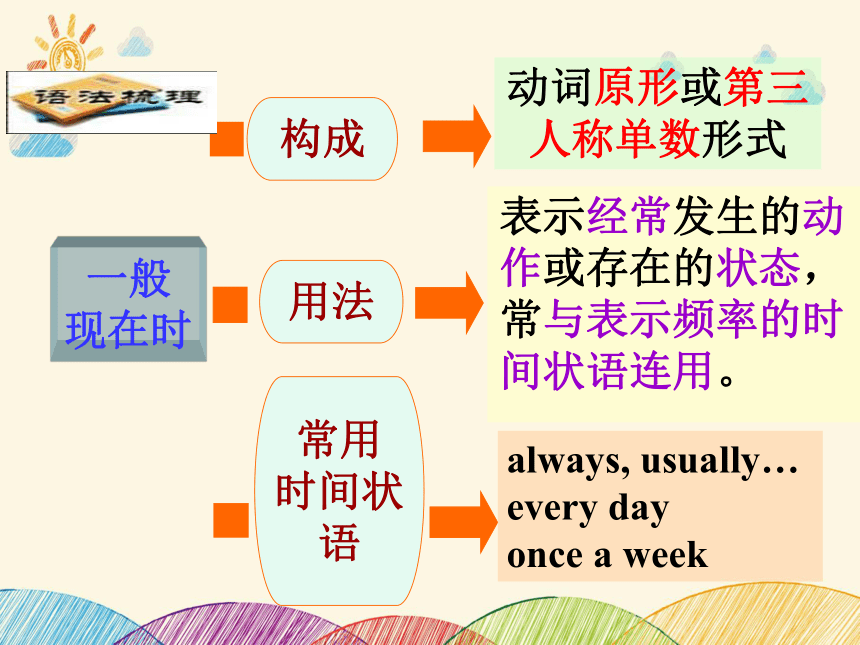
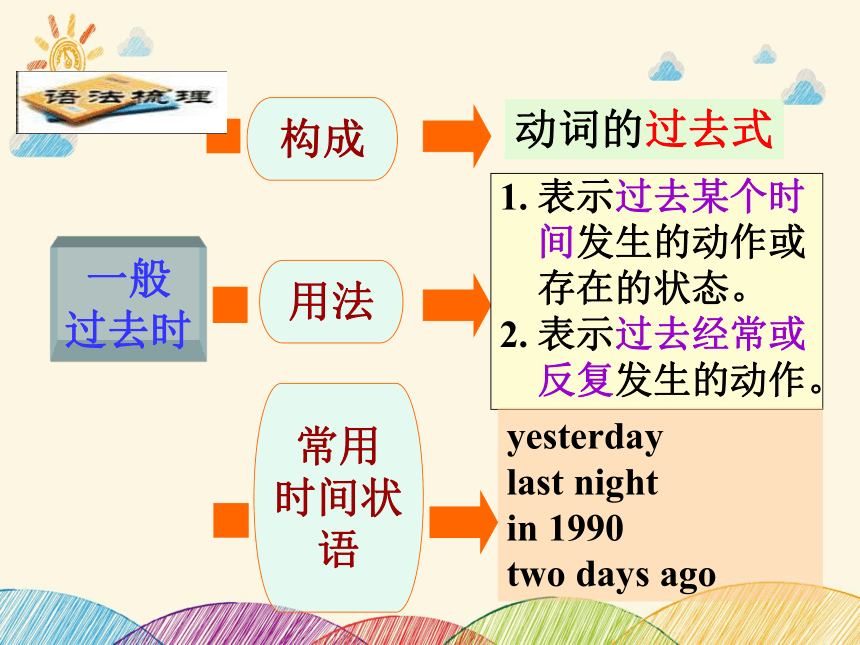
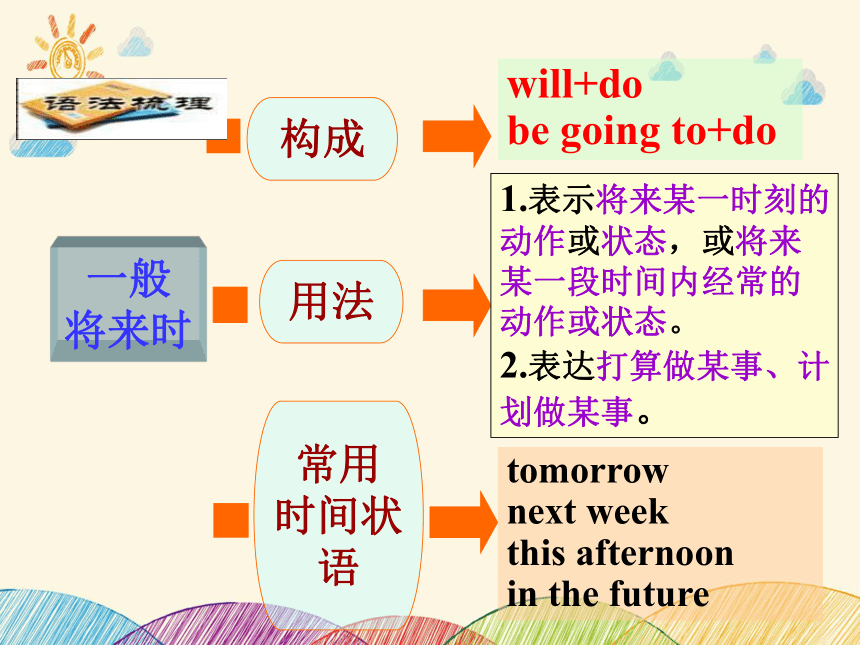
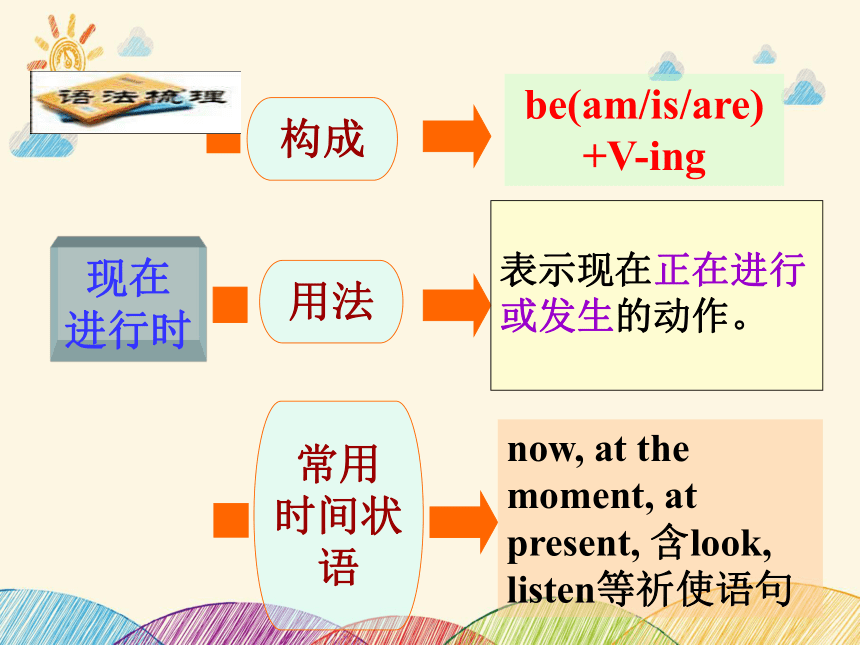
文档简介
(共45张PPT)
Unit 5
Sport
Sport and health
Module 3
To review 6 tenses:
Simple present, Present continuous, Present perfect, Simple future, Simple past, Past continuous
2. To review the passive voice
Objectives
Review of tenses
Racing
Activity
Try to finish the following tasks as quickly as possible.
Ready
She read eight pages of the novel last night.
Ben will take part in the Reading Club next year.
Alice reads books at six o’clock every morning.
What are you doing
I was doing my homework while my parents were watching TV.
Have you had your lunch yet
The simple present tense
The simple past tense
The simple future tense
The present perfect
The present continuous
The past continuous
Task 1: Read the sentences and match them with tenses.
I have just received a letter from my brother, Tim. He ___ (be) in Australia now. He _________ (be) there for six months. Tim is an engineer. He ________ (work) for a big firm and he ____ already _______ (visit) a great number of different places in Australia.
He ____ just ________ (buy) an Australian car and ________ (go) to Alice Springs, a small town in the centre of Australia. He will soon visit Darwin. From there, he _______ (fly) to Perth. He once _____ (go) to Perth four years ago. At that time, he ______________ (dream) about wonderful trips.
is
has been
works
has
visited
has
bought
has gone
will fly
went
was dreaming
Task 2: Complete the passage.
My aunt is a writer. She ____ more than
ten books since 1980.
A. writes B. wrote
C. has written D. will write
2. — When ___ you ___ reading Jane Eyre
— It’s hard to say. I’m busy recently.
A. did; finish B. have; finished
C. will; finish D. do; finish
3. — Have you ever been to Canada
— Yes, I ___ there last year with my parents.
A. have been B. have gone
C. went D. go
Task 3: Choose the best answer.
4. It ___usually ___at this time of year, but today it is raining heavily.
A. is; raining B. won’t; rain
C. has; rained D. doesn’t; rain
5. Jenny ___in the kitchen when you called her at 5 o’clock this afternoon.
A. is cooking B. was cooking
C. cooks D. cooked
6. Cathy, can you answer the door I ___the room.
A. clean B. cleaned
C. have cleaned D. am cleaning
一般
现在时
构成
用法
常用
时间状语
动词原形或第三人称单数形式
表示经常发生的动作或存在的状态,常与表示频率的时间状语连用。
always, usually…
every day
once a week
一般
过去时
构成
用法
常用
时间状语
动词的过去式
1. 表示过去某个时
间发生的动作或
存在的状态。
2. 表示过去经常或
反复发生的动作。
yesterday
last night
in 1990
two days ago
一般
将来时
构成
用法
常用
时间状语
will+do
be going to+do
1.表示将来某一时刻的动作或状态,或将来某一段时间内经常的动作或状态。
2.表达打算做某事、计划做某事。
tomorrow
next week
this afternoon
in the future
现在 进行时
构成
用法
常用
时间状语
be(am/is/are)+V-ing
表示现在正在进行
或发生的动作。
now, at the moment, at present, 含look, listen等祈使语句
过去 进行时
构成
用法
常用
时间状语
be(was/were)+V-ing
表示过去某时正在
进行的动作或存在
的状态。
at 3 p.m. yesterday afternoon, when/while引导的时间状语从句
现在 完成时
构成
用法
常用
时间状语
have/has+done
1.表示动作发生在过去,并对现在有影响。
2.表示从过去一直持续到现在的动作或状态。
already, yet, never, ever, just, for, since
一般现在时&现在进行时
一般现在时强调动作的经常性和反复性,而现在进行时强调动作的暂时性。
He studies in No. 2 Junior High School.
He is studying English in the classroom.
表示感觉或存在状态的动词一般不用现在进行时,而用一般现在时。
This ring belongs to my mother.
过去进行时&一般过去时
过去进行时强调动作的进行过程,而一般过去时强调动作的完成。
I was reading a French novel last night.(不强调读完)
I read a French novel last night.(强调读完)
过去进行时强调动作在过去某时间正在进行,而一般过去时则表示动作在过去某时间发生。
My father was watching TV at seven yesterday.
My father watched TV last night.
过去进行时强调动作的连续性,不可与确定的频度状语连用;一般过去时强调动作的反复性,可与确定的频度状语连用。
The little girl was crying all afternoon yesterday.
The little girl cried five times yesterday
现在完成时&一般过去时
现在完成时强调过去发生的动作与现在的联系或对现在的影响,表示一种因果关系,即:过去发生的动作是因,对现在产生的影响是果。
一般过去时强调过去发生的动作或状态及其发生的时间、地点、方式、原因等,与现在没有关系。
The company has opened an office in Shanghai.
This company opened an office in Shanghai yesterday.
时态 一般现在时 一般过去时 现在进行时 过去进行时 一般将来时 现在完成时
用法 表示经常性发生的动作、习惯性动作或客观真理、科学事实等。 表示过去某个时间发生的动作或存在的状态。 表示现在或现阶段正在进行或发生的动作。 表示过去某时正在进行的动作或存在的状态。 表示将来某个时间要发生的动作或存在的状态。 表示过去发生或者未发生的事对现在造成的影响或结果。
构成
方式 1. 动词be(am/is/are)
+ 表语…
2. 动词原形 + …
(主语是第三人称单数,动词也用第三人称单数) 1. 动词was/were
+ 表语
2. 实义动词的过
去式 + … be(am/is/are) + 动词的V-ing was / were + 动词的V-ing 1. will/shall + 动词原形
(shall 用于第一人称)
2. be going to + 动词原形 主语 + have / has + V-ed + …
句
型
变
化 疑
问
式 1. Be + 主语 + …
2. Do/Does + 主语 +动词原形+ … 1. Was/Were + 主
语 + …
2. Did + 主语 +
动词原形 + … Be + 主语 + 动词的V-ing + … Was / Were + 主语 + 动词的V-ing + …? 1. Will/Shall + 主语 + 动词原形+ …
2. Be + 主语+ going to + 动词原形 + … Have / Has + 主语 + V-ed + …?
否
定
式 1. 主语 + be + not + …
2. 主语+don’t/doesn’t
+ 动词原形 + … 1. 主语 + was/were
+ not +…
2. 主语 + didn’t +
动词原形 + … 主语 + be + not
+ 动词的V-ing + … 主语 +
wasn’t (was not) /
weren’t (were not) + 动词的V-ing + … 1. 主语 + will/shall not + 动词原形 + …
2. 主语 + be + not + going to + 动词原形 + … 主语 + haven’t / hasn’t + V-ed + …
Complete the paragraph below using the correct forms of the verbs in brackets. (P 71)
A
has been
was watching
played
won
watches
wears
is going to /will travel
is going to /will meet
Review of the passive voice
Racing
Activity
Try to finish the following task as quickly as possible.
Ready
请将下列句子改写成被动语态。
1. We can finish the work in two days.
2. They produce silk in Suzhou.
3. The children will sing an English song.
4. He made me do that for him.
5. Did they build the bridge here one year ago
6. We must water the flowers every day.
The work can be finished in two days (by us).
Silk is produced (by them) in Suzhou.
An English song will be sung by the children.
I was made to do that for him.
Was the bridge built here (by them) one year ago
The flowers must be watered (by us) every day.
被动语态表示主语是谓语动作的承受者,被动语态由“be + V-ed”构成。be随着主语人称和数以及时态的不同而变化。
被动语态
For example
They play a basketball match every weekend.
主
谓
宾
A basketball match is played (by them) every weekend.
A basketball match is played (by them) every weekend.
A basketball match is played (by them) every weekend.
A basketball match is played (by them) every weekend.
The first section of New College
English is designed for speaking practice
and is based on pictures and topics.
These computers were made in our own country last year.
Shall we be asked to attend the opening ceremony
①一般现在时的被动语态:am/is/are + V-ed
②一般过去时的被动语态:was/were+V-ed
③一般将来时的被动语态:will/shall+be+V-ed
Tom’s novel has not been published.
④现在完成时的被动语态:have/has+been+V-ed
不可以变成被动语态的情况
只有及物动词才能用于被动语态。具有下列特征的动词不能用于被动语态:
一、不及物动词不能用于被动语态。
( ) The accident was happened three
days ago.
( ) The accident happened three days
ago.
系动词不能用于被动语态。如:
( ) The soup was smelt nice.
( ) The soup smelt nice.
表示度量的动词(如weight) 不能用于被动语态。如:
( ) The elephant was weighed 1,000 kilograms.
( ) The elephant weighed 1,000 kilograms.
某些短语动词用作不及物动词时不能用于被动语态。如:
( ) Great changes have been taken place in that
city.
( ) Great changes have taken place in that city.
二、某些及物动词
以反身代词、each other等代词为宾语的及物动词不能用于被动语态。如:
( ) Themselves were enjoyed last night by them.
( ) They enjoyed themselves last night.
( ) Each other should be helped by us.
( ) We should help each other.
某些表示状态的及物动词(如fit, cost)也不能用于被动语态。如:
( ) The book was cost 10 yuan.
( ) The book cost 10 yuan.
( ) The shirt is fitted me well.
( ) The shirt fits me well.
将主动语态转换为被动语态时,应注意一下两种结构的转换方式。如:
主语+谓语动词+宾语+(疑问词)+to不定式
这类结构转换时通常将宾语转换成主语。
My father taught me how to ride a bike.
I was taught how to ride a bike.
主语+谓语动词(动词短语)+宾语
这类结构转换时,不要遗漏动词短语本身附带的副词或介词。如:
He put up a world map on the wall.
A world map was put up on the wall.
被动语态的转换
时态 主动语态 被动语态
一般现在时 do / does am / is / are + done
现在完成时 have/has + V-ed have/has been done
一般过去时 did was / were + done
一般将来时
will / be going to + do will / be going to + be + done
一般现在时、一般过去时、一般将来时和现在完成时的主动结构和被动结构 (以动词do为例):
S1: Where is bread baked
S2: Bread is baked in a bakery.
In pairs, ask and answer questions about the pictures below. Follow the example. (P 72)
B1
2. S1: Where are reference books stored
S2: Reference books are stored in a
library.
3. S1: Where is money kept
S2: Money is kept in a bank.
4. S1: Where are cars made
S2: Cars are made in a factory.
5: S1: Where are football matches played
S2: Football matches are played in a
stadium.
6: S1 Where are films shown
S2: Films are shown in a cinema.
In pairs, ask and answer questions. Follow the example. (P 73)
B2
1. In 1879, Thomas Edison invented the first practical light bulb.
S1: Who invented the first practical
light bulb
S2: It was invented by Thomas Edison.
S1: When was it invented
S2: It was invented in 1879.
Who discovered America
It was discovered by Columbus.
When was it discovered
It was discovered in 1492.
In 1492, Columbus discovered America.
Practise
Who played an ancient form of football
It was played by the Chinese people.
When was it played
It was played more than 2,000 years ago.
The Chinese people played an ancient form of football more than 2,000 years ago.
Who held the first Olympic Games
They were held by the ancient Greeks.
When were they held
They were held more than 2,700 years ago.
The ancient Greek held the first Olympic Games more than 2,700 years ago.
Change the sentences below into the passive voice. (P 73)
B3
A goal was scored by Paul in the last minute.
The ball was thrown high into the air by her.
The Sports Day will be held by our school on 15th March.
His gloves are cleaned by him after every game.
The Olympic Games will be watched by millions of people.
A poster about popular sport is going to be made by him.
一、用所给词的适当形式填空。
1.He______ swimming in the river every day in summer. (go)
2.It________you are right. (seem) 3.Look, the children__________ basketball on the playground. (play)
4.He___________to the radio when I came in. (listen)
5.It is very cold .I think it_______ . (rain)
6.He______down and began to read his newspaper. (sit)
goes
seems
are playing
was listening
will/is going to rain
sat
7.He is very hungry. He___________ anything for three days. (not eat) 8.I______with you if I have time. (go)
9.-“When ______you ______the car ”
-“ In 1998. ”(buy)
10.We_________ good friends since we met at school. (be)
11.What______you______ at five yesterday afternoon (do)
hasn’t eaten
will go
did buy
have been
were doing
1.I have given this book to the library. This book ____ ____ _____ to the library.
2. Did he break the window yesterday ____ the window ______ __ ___ yesterday
3.We'll put on an English play in our school.
An English play ___ __ ___ on in our school.
4.They use knives for cutting things. Knives ____ ____ for cutting things.
has been given
broken by him
will be put
were used
二、将下列句子变为被动语态,每空一词。
Was
Homework
1. Review the grammar we’ve learned today.
2. Finish the exercises in Learning English.
3. Preview Speaking on page 74-75.
Unit 5
Sport
Sport and health
Module 3
To review 6 tenses:
Simple present, Present continuous, Present perfect, Simple future, Simple past, Past continuous
2. To review the passive voice
Objectives
Review of tenses
Racing
Activity
Try to finish the following tasks as quickly as possible.
Ready
She read eight pages of the novel last night.
Ben will take part in the Reading Club next year.
Alice reads books at six o’clock every morning.
What are you doing
I was doing my homework while my parents were watching TV.
Have you had your lunch yet
The simple present tense
The simple past tense
The simple future tense
The present perfect
The present continuous
The past continuous
Task 1: Read the sentences and match them with tenses.
I have just received a letter from my brother, Tim. He ___ (be) in Australia now. He _________ (be) there for six months. Tim is an engineer. He ________ (work) for a big firm and he ____ already _______ (visit) a great number of different places in Australia.
He ____ just ________ (buy) an Australian car and ________ (go) to Alice Springs, a small town in the centre of Australia. He will soon visit Darwin. From there, he _______ (fly) to Perth. He once _____ (go) to Perth four years ago. At that time, he ______________ (dream) about wonderful trips.
is
has been
works
has
visited
has
bought
has gone
will fly
went
was dreaming
Task 2: Complete the passage.
My aunt is a writer. She ____ more than
ten books since 1980.
A. writes B. wrote
C. has written D. will write
2. — When ___ you ___ reading Jane Eyre
— It’s hard to say. I’m busy recently.
A. did; finish B. have; finished
C. will; finish D. do; finish
3. — Have you ever been to Canada
— Yes, I ___ there last year with my parents.
A. have been B. have gone
C. went D. go
Task 3: Choose the best answer.
4. It ___usually ___at this time of year, but today it is raining heavily.
A. is; raining B. won’t; rain
C. has; rained D. doesn’t; rain
5. Jenny ___in the kitchen when you called her at 5 o’clock this afternoon.
A. is cooking B. was cooking
C. cooks D. cooked
6. Cathy, can you answer the door I ___the room.
A. clean B. cleaned
C. have cleaned D. am cleaning
一般
现在时
构成
用法
常用
时间状语
动词原形或第三人称单数形式
表示经常发生的动作或存在的状态,常与表示频率的时间状语连用。
always, usually…
every day
once a week
一般
过去时
构成
用法
常用
时间状语
动词的过去式
1. 表示过去某个时
间发生的动作或
存在的状态。
2. 表示过去经常或
反复发生的动作。
yesterday
last night
in 1990
two days ago
一般
将来时
构成
用法
常用
时间状语
will+do
be going to+do
1.表示将来某一时刻的动作或状态,或将来某一段时间内经常的动作或状态。
2.表达打算做某事、计划做某事。
tomorrow
next week
this afternoon
in the future
现在 进行时
构成
用法
常用
时间状语
be(am/is/are)+V-ing
表示现在正在进行
或发生的动作。
now, at the moment, at present, 含look, listen等祈使语句
过去 进行时
构成
用法
常用
时间状语
be(was/were)+V-ing
表示过去某时正在
进行的动作或存在
的状态。
at 3 p.m. yesterday afternoon, when/while引导的时间状语从句
现在 完成时
构成
用法
常用
时间状语
have/has+done
1.表示动作发生在过去,并对现在有影响。
2.表示从过去一直持续到现在的动作或状态。
already, yet, never, ever, just, for, since
一般现在时&现在进行时
一般现在时强调动作的经常性和反复性,而现在进行时强调动作的暂时性。
He studies in No. 2 Junior High School.
He is studying English in the classroom.
表示感觉或存在状态的动词一般不用现在进行时,而用一般现在时。
This ring belongs to my mother.
过去进行时&一般过去时
过去进行时强调动作的进行过程,而一般过去时强调动作的完成。
I was reading a French novel last night.(不强调读完)
I read a French novel last night.(强调读完)
过去进行时强调动作在过去某时间正在进行,而一般过去时则表示动作在过去某时间发生。
My father was watching TV at seven yesterday.
My father watched TV last night.
过去进行时强调动作的连续性,不可与确定的频度状语连用;一般过去时强调动作的反复性,可与确定的频度状语连用。
The little girl was crying all afternoon yesterday.
The little girl cried five times yesterday
现在完成时&一般过去时
现在完成时强调过去发生的动作与现在的联系或对现在的影响,表示一种因果关系,即:过去发生的动作是因,对现在产生的影响是果。
一般过去时强调过去发生的动作或状态及其发生的时间、地点、方式、原因等,与现在没有关系。
The company has opened an office in Shanghai.
This company opened an office in Shanghai yesterday.
时态 一般现在时 一般过去时 现在进行时 过去进行时 一般将来时 现在完成时
用法 表示经常性发生的动作、习惯性动作或客观真理、科学事实等。 表示过去某个时间发生的动作或存在的状态。 表示现在或现阶段正在进行或发生的动作。 表示过去某时正在进行的动作或存在的状态。 表示将来某个时间要发生的动作或存在的状态。 表示过去发生或者未发生的事对现在造成的影响或结果。
构成
方式 1. 动词be(am/is/are)
+ 表语…
2. 动词原形 + …
(主语是第三人称单数,动词也用第三人称单数) 1. 动词was/were
+ 表语
2. 实义动词的过
去式 + … be(am/is/are) + 动词的V-ing was / were + 动词的V-ing 1. will/shall + 动词原形
(shall 用于第一人称)
2. be going to + 动词原形 主语 + have / has + V-ed + …
句
型
变
化 疑
问
式 1. Be + 主语 + …
2. Do/Does + 主语 +动词原形+ … 1. Was/Were + 主
语 + …
2. Did + 主语 +
动词原形 + … Be + 主语 + 动词的V-ing + … Was / Were + 主语 + 动词的V-ing + …? 1. Will/Shall + 主语 + 动词原形+ …
2. Be + 主语+ going to + 动词原形 + … Have / Has + 主语 + V-ed + …?
否
定
式 1. 主语 + be + not + …
2. 主语+don’t/doesn’t
+ 动词原形 + … 1. 主语 + was/were
+ not +…
2. 主语 + didn’t +
动词原形 + … 主语 + be + not
+ 动词的V-ing + … 主语 +
wasn’t (was not) /
weren’t (were not) + 动词的V-ing + … 1. 主语 + will/shall not + 动词原形 + …
2. 主语 + be + not + going to + 动词原形 + … 主语 + haven’t / hasn’t + V-ed + …
Complete the paragraph below using the correct forms of the verbs in brackets. (P 71)
A
has been
was watching
played
won
watches
wears
is going to /will travel
is going to /will meet
Review of the passive voice
Racing
Activity
Try to finish the following task as quickly as possible.
Ready
请将下列句子改写成被动语态。
1. We can finish the work in two days.
2. They produce silk in Suzhou.
3. The children will sing an English song.
4. He made me do that for him.
5. Did they build the bridge here one year ago
6. We must water the flowers every day.
The work can be finished in two days (by us).
Silk is produced (by them) in Suzhou.
An English song will be sung by the children.
I was made to do that for him.
Was the bridge built here (by them) one year ago
The flowers must be watered (by us) every day.
被动语态表示主语是谓语动作的承受者,被动语态由“be + V-ed”构成。be随着主语人称和数以及时态的不同而变化。
被动语态
For example
They play a basketball match every weekend.
主
谓
宾
A basketball match is played (by them) every weekend.
A basketball match is played (by them) every weekend.
A basketball match is played (by them) every weekend.
A basketball match is played (by them) every weekend.
The first section of New College
English is designed for speaking practice
and is based on pictures and topics.
These computers were made in our own country last year.
Shall we be asked to attend the opening ceremony
①一般现在时的被动语态:am/is/are + V-ed
②一般过去时的被动语态:was/were+V-ed
③一般将来时的被动语态:will/shall+be+V-ed
Tom’s novel has not been published.
④现在完成时的被动语态:have/has+been+V-ed
不可以变成被动语态的情况
只有及物动词才能用于被动语态。具有下列特征的动词不能用于被动语态:
一、不及物动词不能用于被动语态。
( ) The accident was happened three
days ago.
( ) The accident happened three days
ago.
系动词不能用于被动语态。如:
( ) The soup was smelt nice.
( ) The soup smelt nice.
表示度量的动词(如weight) 不能用于被动语态。如:
( ) The elephant was weighed 1,000 kilograms.
( ) The elephant weighed 1,000 kilograms.
某些短语动词用作不及物动词时不能用于被动语态。如:
( ) Great changes have been taken place in that
city.
( ) Great changes have taken place in that city.
二、某些及物动词
以反身代词、each other等代词为宾语的及物动词不能用于被动语态。如:
( ) Themselves were enjoyed last night by them.
( ) They enjoyed themselves last night.
( ) Each other should be helped by us.
( ) We should help each other.
某些表示状态的及物动词(如fit, cost)也不能用于被动语态。如:
( ) The book was cost 10 yuan.
( ) The book cost 10 yuan.
( ) The shirt is fitted me well.
( ) The shirt fits me well.
将主动语态转换为被动语态时,应注意一下两种结构的转换方式。如:
主语+谓语动词+宾语+(疑问词)+to不定式
这类结构转换时通常将宾语转换成主语。
My father taught me how to ride a bike.
I was taught how to ride a bike.
主语+谓语动词(动词短语)+宾语
这类结构转换时,不要遗漏动词短语本身附带的副词或介词。如:
He put up a world map on the wall.
A world map was put up on the wall.
被动语态的转换
时态 主动语态 被动语态
一般现在时 do / does am / is / are + done
现在完成时 have/has + V-ed have/has been done
一般过去时 did was / were + done
一般将来时
will / be going to + do will / be going to + be + done
一般现在时、一般过去时、一般将来时和现在完成时的主动结构和被动结构 (以动词do为例):
S1: Where is bread baked
S2: Bread is baked in a bakery.
In pairs, ask and answer questions about the pictures below. Follow the example. (P 72)
B1
2. S1: Where are reference books stored
S2: Reference books are stored in a
library.
3. S1: Where is money kept
S2: Money is kept in a bank.
4. S1: Where are cars made
S2: Cars are made in a factory.
5: S1: Where are football matches played
S2: Football matches are played in a
stadium.
6: S1 Where are films shown
S2: Films are shown in a cinema.
In pairs, ask and answer questions. Follow the example. (P 73)
B2
1. In 1879, Thomas Edison invented the first practical light bulb.
S1: Who invented the first practical
light bulb
S2: It was invented by Thomas Edison.
S1: When was it invented
S2: It was invented in 1879.
Who discovered America
It was discovered by Columbus.
When was it discovered
It was discovered in 1492.
In 1492, Columbus discovered America.
Practise
Who played an ancient form of football
It was played by the Chinese people.
When was it played
It was played more than 2,000 years ago.
The Chinese people played an ancient form of football more than 2,000 years ago.
Who held the first Olympic Games
They were held by the ancient Greeks.
When were they held
They were held more than 2,700 years ago.
The ancient Greek held the first Olympic Games more than 2,700 years ago.
Change the sentences below into the passive voice. (P 73)
B3
A goal was scored by Paul in the last minute.
The ball was thrown high into the air by her.
The Sports Day will be held by our school on 15th March.
His gloves are cleaned by him after every game.
The Olympic Games will be watched by millions of people.
A poster about popular sport is going to be made by him.
一、用所给词的适当形式填空。
1.He______ swimming in the river every day in summer. (go)
2.It________you are right. (seem) 3.Look, the children__________ basketball on the playground. (play)
4.He___________to the radio when I came in. (listen)
5.It is very cold .I think it_______ . (rain)
6.He______down and began to read his newspaper. (sit)
goes
seems
are playing
was listening
will/is going to rain
sat
7.He is very hungry. He___________ anything for three days. (not eat) 8.I______with you if I have time. (go)
9.-“When ______you ______the car ”
-“ In 1998. ”(buy)
10.We_________ good friends since we met at school. (be)
11.What______you______ at five yesterday afternoon (do)
hasn’t eaten
will go
did buy
have been
were doing
1.I have given this book to the library. This book ____ ____ _____ to the library.
2. Did he break the window yesterday ____ the window ______ __ ___ yesterday
3.We'll put on an English play in our school.
An English play ___ __ ___ on in our school.
4.They use knives for cutting things. Knives ____ ____ for cutting things.
has been given
broken by him
will be put
were used
二、将下列句子变为被动语态,每空一词。
Was
Homework
1. Review the grammar we’ve learned today.
2. Finish the exercises in Learning English.
3. Preview Speaking on page 74-75.
